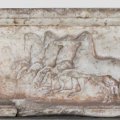Major studies at the University of Queensland are highlighting the opportunities and the challenges for Australia in the burgeoning Chinese beef and cattle industry.
Executive Dean (Business, Economics and Law) Professor John Longworth and Agriculture Department senior lecturer Dr Colin Brown are leading two research projects, collectively worth nearly $1 million, analysing socio-economic and agribusiness developments in the Chinese beef and cattle industry.
One project is funded by a three-year, $669,406 grant from the Australian Centre for International Agricultural Research (ACIAR) while the other is funded by a two-year, $260,768 Meat Research Corporation (MRC) grant.
Both projects began in 1997 and involve several field trips to China each year. The research involves visits to urban areas to examine beef consumption, government policies, port facilities and trade issues as well as to many cattle raising rural areas such as the Zhongyuan beef belt in central-eastern China, the pastoral area in north China and the grain-surplus areas in north-east China.
The projects also involve close collaboration with staff and researchers from three Chinese organisations - the Institute of Agricultural Economics, Chinese Academy of Agricultural Sciences, the Institute for Rural Development, Chinese Academy of Social Sciences and the Department of International Co-operation, Chinese Ministry of Agriculture.
Dr Brown said that since 1980, cattle numbers in China had risen from 71 million to 131 million, a massive number considering Australia, a major beef producer, had around 24 million beef cattle.
'Beef production has increased 18-fold from 250,000 tonnes in 1980 to 4.4 million tonnes in 1996,' he said.
Professor Longworth said such growth in the Chinese beef and cattle industry not only offered the Australian beef industry current opportunities to export agribusiness expertise but also, in the long term, there was a potential market for live cattle and even some types of beef in China.
'The Chinese government is keen to commercialise and modernise the industry. Foreign expertise would be useful in areas such as breeding programs, pasture and cattle management, health and disease inspection procedures, meat distribution systems, processing and grading systems,' Professor Longworth said.
'One of the aims of the MRC grant is to investigate whether there is a role for Australian expertise in these areas. Research under the MRC grant also explores China's potential as a cattle and beef importer and exporter.'
Preliminary study results suggested growth in the Chinese beef and cattle industry had been so rapid, it had outpaced necessary institutional reform and marketing services development, Dr Brown said.
'This stands to threaten beef quality and inhibit future growth in the Chinese beef industry,' he said.
Reasons for the explosion in beef and cattle production stemmed partly from government-initiated economic reforms freeing up meat markets.
'Chinese officials now consider beef to be more nutritious and less grain-intensive than pork. Beef production has been encouraged through tax exemptions, provision of technical services and finance and direct production and input subsidies,' Dr Brown said.
'Other reasons for increased beef production include growing mechanisation reducing the need to use cattle for draught purposes, research and development programs focused on improved cattle breeding and higher real incomes leading to increased beef consumption and demand.'
He said the government had also been keen to find a use for large reserves of straw, a by-product of harvesting wheat, rice and corn. Burning excess straw was no longer viable because of air pollution.
'Straw is treated with urea and various supplements and fed to cattle. The government views this as an efficient use of a surplus resource,' he said.
The major emphasis of the ACIAR-funded research is on the impact of the rapid development of the beef and cattle industry on socio-economic conditions in the Chinese production sector.
Dr Brown said the ACIAR project aimed to assist the Chinese government to develop policies and strategies to maximise the social and economic benefits of the beef and cattle industry's expansion.
At the same time, Professor Longworth said the study would investigate China's potential to become a major player in world beef markets, a matter of great importance to Australia since it was the largest beef exporter.
'While China has the largest bovine herd in the world, it currently accounts for less than one percent of world trade. However, the Australian industry needs to be familiar with developments, especially any moves by China to export beef to our traditional markets in Asia,' he said.
For more information, contact Professor Longworth (telephone 07 3365 6775) or Dr Brown (telephone 07 3365 2148).
.jpg)



